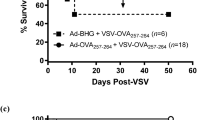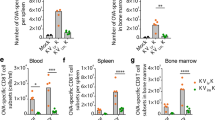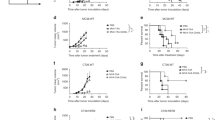Abstract
A generally applicable, easy-to-use method of focusing a patient's immune system to eradicate or prevent cancer has been elusive. We are attempting to develop a targeted virus to accomplish these aims. We previously created a recombinant replicating vesicular stomatitis virus (VSV) that preferentially infected Her2/neu expressing breast cancer cells and showed therapeutic efficacy in an implanted Balb/c mouse tumor model. The current work shows that this therapy generated therapeutic anti-tumor CD4 T cells against multiple tumor antigens. CD4 T cells transferred directly from cured donor mice could eradicate established tumors in host mice. T cells were transferred directly from donor mice and were not stimulated ex vivo. Both tumors that expressed Her2/neu and those that did not were cured by transferred T cells. Analysis of cytokines secreted by anti-tumor memory CD4 T cells displayed a multifunctional pattern with high levels of interferon-γ, interleukin (IL)-4 and IL-17. Anti-tumor memory CD4 T cells traveled to the mesenteric lymph nodes and were activated there. Treatment with targeted recombinant replicating VSV is a potent immune adjuvant that generates therapeutic, multifunctional anti-tumor memory CD4 T cells that recognize multiple tumor antigens. Immunity elicited by viral therapy is independent of host major histocompatibility complex or knowledge of tumor antigens. Virus-induced tumor immunity could have great benefit in the prevention and treatment of tumor metastases.
This is a preview of subscription content, access via your institution
Access options
Subscribe to this journal
Receive 12 print issues and online access
$259.00 per year
only $21.58 per issue
Buy this article
- Purchase on Springer Link
- Instant access to full article PDF
Prices may be subject to local taxes which are calculated during checkout






Similar content being viewed by others
References
Wei MQ, Mengesha A, Good D, Anne J, Wei MQ, Mengesha A et al. Bacterial targeted tumour therapy-dawn of a new era. Cancer Lett 2008; 259: 16–27.
Finn OJ, Finn OJ . Cancer immunology. N Engl J Med 2008; 358: 2704–2715.
Rosenberg SA, Yang JC, Restifo NP . Cancer immunotherapy: moving beyond current vaccines. Nat Med 2004; 10: 909–915.
Dudley ME, Wunderlich JR, Yang JC, Sherry RM, Topalian SL, Restifo NP et al. Adoptive cell transfer therapy following non-myeloablative but lymphodepleting chemotherapy for the treatment of patients with refractory metastatic melanoma. J Clin Oncol 2005; 23: 2346–2357.
Drake CG, Drake CG . Prostate cancer as a model for tumour immunotherapy. Nat Rev Immunol 2010; 10: 580–593.
de Mattos CA, de Mattos CC, Rupprecht CE . Rhabdoviruses. In: Knipe D, Howley P (eds). Fundamental Virology, 4th edn. Lippincott Williams & Wilkins: Philadelphia, 2001, pp 1245–1277.
Stojdl DF, Lichty B, Knowles S, Marius R, Atkins H, Sonenberg N et al. Exploiting tumor-specific defects in the interferon pathway with a previously unknown oncolytic virus. Nat Med 2000; 6: 821–825.
Obuchi M, Fernandez M, Barber GN . Development of recombinant vesicular stomatitis viruses that exploit defects in host defense to augment specific oncolytic activity. J Virol 2003; 77: 8843–8856.
Fernandez M, Porosnicu M, Markovic D, Barber GN . Genetically engineered vesicular stomatitis virus in gene therapy: application for treatment of malignant disease. J Virol 2002; 76: 895–904.
Diaz RM, Galivo F, Kottke T, Wongthida P, Qiao J, Thompson J et al. Oncolytic immunovirotherapy for melanoma using vesicular stomatitis virus. Cancer Res 2007; 67: 2840–2848.
Porosnicu M, Mian A, Barber GN . The oncolytic effect of recombinant vesicular stomatitis virus is enhanced by expression of the fusion cytosine deaminase/uracil phosphoribosyltransferase suicide gene. Cancer Res 2003; 63: 8366–8376.
Ebert O, Shinozaki K, Huang TG, Savontaus MJ, Garcia-Sastre A, Woo SL . Oncolytic vesicular stomatitis virus for treatment of orthotopic hepatocellular carcinoma in immune-competent rats. Cancer Res 2003; 63: 3605–3611.
Bergman I, Whitaker-Dowling P, Gao Y, Griffin JA . Preferential targeting of vesicular stomatitis virus to breast cancer cells. Virology 2004; 330: 24–33.
Pilon SA, Kelly C, Wei WZ . Broadening of epitope recognition during immune rejection of ErbB-2-positive tumor prevents growth of ErbB-2-negative tumor. J Immunol 2003; 170: 1202–1208.
Demaria S, Kawashima N, Yang AM, Devitt ML, Babb JS, Allison JP et al. Immune-mediated inhibition of metastases after treatment with local radiation and CTLA-4 blockade in a mouse model of breast cancer. Clin Cancer Res 2005; 11: 728–734.
Bergman I, Griffin JA, Gao Y, Whitaker-Dowling P . Treatment of implanted mammary tumors with recombinant vesicular stomatitis virus targeted to Her2/neu. Int J Cancer 2007; 121: 425–430.
Lawson ND, Stillman EA, Whitt MA, Rose JK . Recombinant vesicular stomatitis viruses from DNA. Proc Natl Acad Sci USA 1995; 92: 4477–4481.
Gao Y, Whitaker-Dowling P, Watkins SC, Griffin JA, Bergman I . Rapid adaptation of a recombinant vesicular stomatitis virus to a targeted cell line. J Virol 2006; 80: 8603–8612.
Wei WZ, Shi WP, Galy A, Lichlyter D, Hernandez S, Groner B et al. Protection against mammary tumor growth by vaccination with full-length, modified human ErbB-2 DNA. Int J Cancer 1999; 81: 748–754.
Gao Y, Whitaker-Dowling P, Griffin JA, Barmada MA, Bergman I . Recombinant vesicular stomatitis virus targeted to Her2/neu combined with anti-CTLA4 antibody eliminates implanted mammary tumors. Cancer Gene Ther 2009; 16: 44–52.
Bracci L, Moschella F, Sestili P, La SV, Valentini M, Canini I et al. Cyclophosphamide enhances the antitumor efficacy of adoptively transferred immune cells through the induction of cytokine expression, B-cell and T-cell homeostatic proliferation, and specific tumor infiltration. Clin Cancer Res 2007; 13: 644–653.
Taieb J, Chaput N, Schartz N, Roux S, Novault S, Menard C et al. Chemoimmunotherapy of tumors: cyclophosphamide synergizes with exosome based vaccines. J Immunol 2006; 176: 2722–2729.
Viaud S, Flament C, Zoubir M, Pautier P, LeCesne A, Ribrag V et al. Cyclophosphamide induces differentiation of Th17 cells in cancer patients. Cancer Res 2011; 71: 661–665.
Liu Z, Noh HS, Chen J, Kim JH, Falo Jr LD, You Z et al. Potent tumor-specific protection ignited by adoptively transferred CD4+ T cells. J Immunol 2008; 181: 4363–4370.
Muranski P, Restifo NP, Muranski P, Restifo NP . Adoptive immunotherapy of cancer using CD4(+) T cells. Curr Opin Immunol 2009; 21: 200–208.
Cerullo V, Pesonen S, Diaconu I, Escutenaire S, Arstila PT, Ugolini M et al. Oncolytic adenovirus coding for granulocyte macrophage colony-stimulating factor induces antitumoral immunity in cancer patients. Cancer Res 2010; 70: 4297–4309.
Slamon DJ, Leyland-Jones B, Shak S, Fuchs H, Paton V, Bajamonde A et al. Use of chemotherapy plus a monoclonal antibody against HER2 for metastatic breast cancer that overexpresses HER2. N Engl J Med 2001; 344: 783–792.
Palucka K, Ueno H, Banchereau J, Palucka K, Ueno H, Banchereau J . Recent developments in cancer vaccines. J Immunol 2011; 186: 1325–1331.
Kantoff PW, Schuetz TJ, Blumenstein BA, Glode LM, Bilhartz DL, Wyand M et al. Overall survival analysis of a phase II randomized controlled trial of a poxviral-based PSA-targeted immunotherapy in metastatic castration-resistant prostate cancer. J Clin Oncol 2010; 28: 1099–1105.
Finkle D, Quan ZR, Asghari V, Kloss J, Ghaboosi N, Mai E et al. HER2-targeted therapy reduces incidence and progression of midlife mammary tumors in female murine mammary tumor virus huHER2-transgenic mice. Clin Cancer Res 2004; 10: 2499–2511.
Morgan RA, Dudley ME, Rosenberg SA, Morgan RA, Dudley ME, Rosenberg SA . Adoptive cell therapy: genetic modification to redirect effector cell specificity. Cancer J 2010; 16: 336–341.
Rosenberg SA, Dudley ME, Rosenberg SA, Dudley ME . Adoptive cell therapy for the treatment of patients with metastatic melanoma. Curr Opin Immunol 2009; 21: 233–240.
Cohen PA, Peng L, Plautz GE, Kim JA, Weng DE, Shu S et al. CD4+ T cells in adoptive immunotherapy and the indirect mechanism of tumor rejection. Crit Rev Immunol 2000; 20: 17–56.
Muranski P, Boni A, Antony PA, Cassard L, Irvine KR, Kaiser A et al. Tumor-specific Th17-polarized cells eradicate large established melanoma. Blood 2008; 112: 362–373.
Lundin KU, Hofgaard PO, Omholt H, Munthe LA, Corthay A, Bogen B et al. Therapeutic effect of idiotype-specific CD4+ T cells against B-cell lymphoma in the absence of anti-idiotypic antibodies. Blood 2003; 102: 605–612.
Nishimura T, Iwakabe K, Sekimoto M, Ohmi Y, Yahata T, Nakui M et al. Distinct role of antigen-specific T helper type 1 (Th1) and Th2 cells in tumor eradication in vivo. J Exp Med 1999; 190: 617–627.
Kennedy R, Celis E, Kennedy R, Celis E . Multiple roles for CD4+ T cells in anti-tumor immune responses. Immunol Rev 2008; 222: 129–144.
Liu Z, Tian S, Falo Jr LD, Sakaguchi S, You Z, Liu Z et al. Therapeutic immunity by adoptive tumor-primed CD4(+) T-cell transfer in combination with in vivo GITR ligation. Mol Ther 2009; 17: 1274–1281.
Perez-Diez A, Joncker NT, Choi K, Chan WF, Anderson CC, Lantz O et al. CD4 cells can be more efficient at tumor rejection than CD8 cells. Blood 2007; 109: 5346–5354.
Xie Y, Akpinarli A, Maris C, Hipkiss EL, Lane M, Kwon EK et al. Naive tumor-specific CD4(+) T cells differentiated in vivo eradicate established melanoma. J Exp Med 2010; 207: 651–667.
Hunder NN, Wallen H, Cao J, Hendricks DW, Reilly JZ, Rodmyre R et al. Treatment of metastatic melanoma with autologous CD4+ T cells against NY-ESO-1. N Engl J Med 2008; 358: 2698–2703.
Klebanoff CA, Gattinoni L, Torabi-Parizi P, Kerstann K, Cardones AR, Finkelstein SE et al. Central memory self/tumor-reactive CD8+ T cells confer superior antitumor immunity compared with effector memory T cells. Proc Natl Acad Sci USA 2005; 102: 9571–9576.
Huang H, Bi XG, Yuan JY, Xu SL, Guo XL, Xiang J . Combined CD4+ Th1 effect and lymphotactin transgene expression enhance CD8+ Tc1 tumor localization and therapy. Gene Ther 2005; 12: 999–1010.
Martin-Orozco N, Muranski P, Chung Y, Yang XO, Yamazaki T, Lu S et al. T helper 17 cells promote cytotoxic T cell activation in tumor immunity. Immunity 2009; 31: 787–798.
Kryczek I, Wei S, Szeliga W, Vatan L, Zou W, Kryczek I et al. Endogenous IL-17 contributes to reduced tumor growth and metastasis. Blood 2009; 114: 357–359.
McKinstry KK, Strutt TM, Swain SL, McKinstry KK, Strutt TM, Swain SL . The potential of CD4 T-cell memory. Immunology 2010; 130: 1–9.
Castellino F, Huang AY, tan-Bonnet G, Stoll S, Scheinecker C, Germain RN et al. Chemokines enhance immunity by guiding naive CD8+ T cells to sites of CD4+ T cell-dendritic cell interaction. Nature 2006; 440: 890–895.
Acknowledgements
This study was supported in part by NIH Grant number RO1 CA104404. The contents of this study are solely the responsibility of the authors and do not necessarily represent the official views of the granting institution. We thank Drs Wei-Zen Wei, John K Rose, Irvin SY Chen, James P Allison and Genentech who very generously supplied materials as noted in the text. We thank Erich Scheller for technical assistance.
Author information
Authors and Affiliations
Corresponding author
Ethics declarations
Competing interests
The authors declare no conflict of interest.
Rights and permissions
About this article
Cite this article
Gao, Y., Whitaker-Dowling, P., Griffin, J. et al. Treatment with targeted vesicular stomatitis virus generates therapeutic multifunctional anti-tumor memory CD4 T cells. Cancer Gene Ther 19, 282–291 (2012). https://doi.org/10.1038/cgt.2011.90
Received:
Revised:
Accepted:
Published:
Issue Date:
DOI: https://doi.org/10.1038/cgt.2011.90
Keywords
This article is cited by
-
Variability in CRP, regulatory T cells and effector T cells over time in gynaecological cancer patients: a study of potential oscillatory behaviour and correlations
Journal of Translational Medicine (2014)



